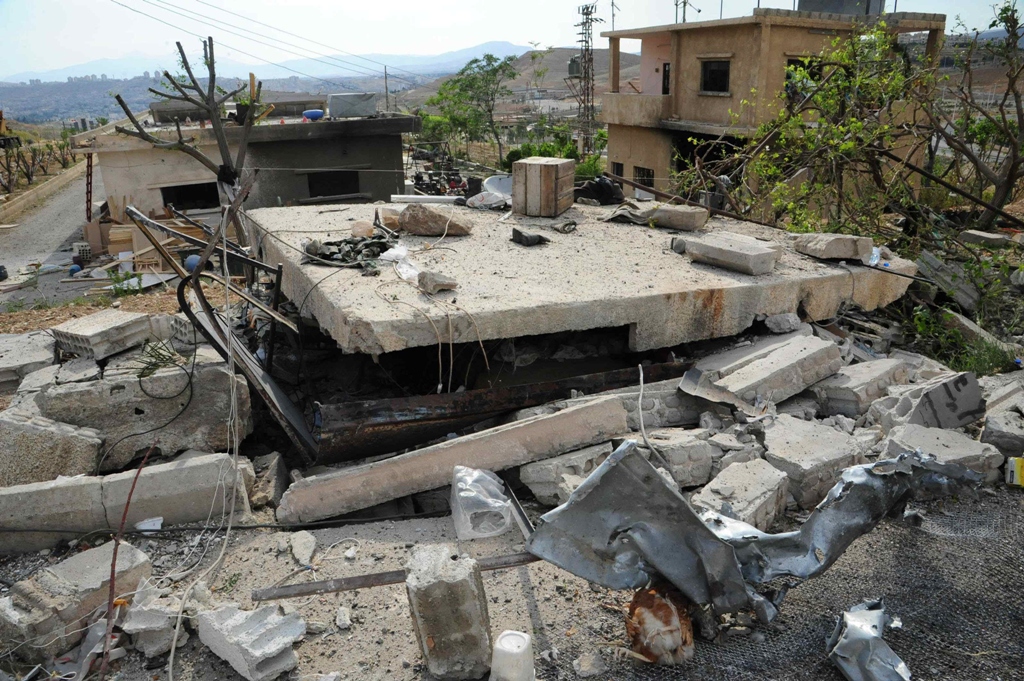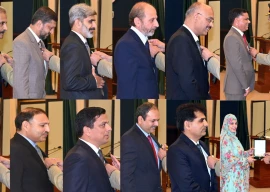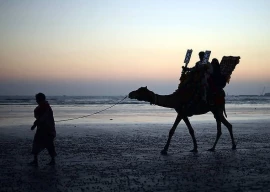
UN human rights investigator Carla del Ponte, meanwhile, said that rebels had used the deadly nerve agent sarin in their fight to oust Syria's regime, although a commission of inquiry later said there was no conclusive proof and the United States said it was "highly skeptical".
"At least 42 soldiers were killed in the strikes, and another 100 who would usually be at the targeted sites remain unaccounted for," Syrian Observatory for Human Rights director Rami Abdel Rahman told AFP.
The strikes early on Sunday near Damascus were the Jewish state's second reported air raids on Syria in 48 hours. An early Friday raid had targeted a weapons storage facility at Damascus airport.
A senior Israeli source said the raids targeted Iranian weapons destined for the Lebanese militant group Hezbollah.
Iran and the Shia group Hezbollah are steadfast allies of Syrian President Bashar al-Assad's regime, and arch-foes of Israel.
A Syrian official in Damascus, reached by phone from Beirut, warned "Syria will respond to the Israeli aggression and will choose the moment to do so."
"It might not be immediate because Israel now is on high alert," he added. "We will wait but we will answer."
Two rockets fired from Syrian territory exploded inside the Israeli-occupied Golan Heights on Monday, without causing casualties or damage, an Israeli army spokesperson said, suggesting it was a spillover from the conflict inside Syria.
UN leader Ban warned against any escalation of a conflict that has killed more than 70,000 people in Syria since it erupted in March 2011.
"The secretary-general calls on all sides to exercise maximum calm and restraint, and to act with a sense of responsibility to prevent an escalation of what is already a devastating and highly dangerous conflict," his spokesperson Martin Nesirky said.
The EU also said it feared recent developments "risk dragging the region into an expanding conflict."
Russian President Vladimir Putin held telephone talks with Israeli Prime Minister Benjamin Netanyahu over the Syrian conflict, the Kremlin said Monday.
Putin and Netanyahu discussed the "situation in the region and the situation around Syria," Putin's spokesperson Dmitry Peskov said in a statement to Russian news agencies, without giving further details.
The foreign ministry in Russia, the most powerful ally of Assad's regime, had earlier expressed concern over the air strikes.
And China implicitly criticised the strikes as Netanyahu arrived in Shanghai, saying "we are opposed to the use of force and believe that the sovereignty of any country should be respected".
The Syrian regime's main regional ally Iran denied the weapons targeted were from the Islamic republic.
A diplomatic source in Beirut told AFP the sites were the Jamraya military facility, a nearby weapons depot and an anti-aircraft unit in Sabura, west of the capital.
UN says rebels, not Syrian army used sarin gas
UN human rights investigator Del Ponte, meanwhile, said there was evidence that Syrian rebels had used the deadly nerve agent sarin.
"According to the testimonies we have gathered, the rebels have used chemical weapons, making use of sarin gas," the former UN war crimes prosecutor said in a Swiss radio interview.
"We still have to deepen our investigation, verify and confirm (the findings) through new witness testimony, but according to what we have established so far, it is at the moment opponents of the regime who are using sarin gas," she said.
But UN investigators into rights abuses in Syria stressed Monday they had no conclusive proof that either side in the conflict has used chemical weapons.
"The Independent International Commission of Inquiry on the Syrian Arab Republic wishes to clarify that it has not reached conclusive findings as to the use of chemical weapons in Syria by any parties to the conflict," the commission said.
And the White House said it was "highly sceptical of suggestions that the opposition could have or did use chemical weapons."
"We find it highly likely that any chemical weapon use that has taken place in Syria was done by the Assad regime. And that remains our position," White House spokesperson Jay Carney said.
US President Barack Obama has said the use of chemical weapons in the conflict was a "red line" for his administration but also that he does not foresee US troops on the ground in Syria.
The Syrian opposition National Coalition, for its part, condemned any use of chemical weapons in the country's conflict and said only the regime had such capabilities.
On the diplomatic front, US Secretary of State John Kerry was Monday heading to Russia on his first visit since taking up the post, travelling with a diplomatic bag bulging with global problems including the war in Syria.
COMMENTS (5)
Comments are moderated and generally will be posted if they are on-topic and not abusive.
For more information, please see our Comments FAQ











































@Vivek.
Perhaps a more productive use of time is in order? Only a suggestion, my friend.
We have heard that before!
Pakistan should help Syria, by declaring war on Israel. Pakistan is the only Islamic country, which has the resources and technology to defeat Israel. Inshallah, this will happen.
"We will wait but we will answer.”
Oh. When and with what? You have been waiting for like since the 80s. And IAF has been striking inside Syria with impunity for sometime now. Shows what you can do. Precisely nothing.
Death to Israel.